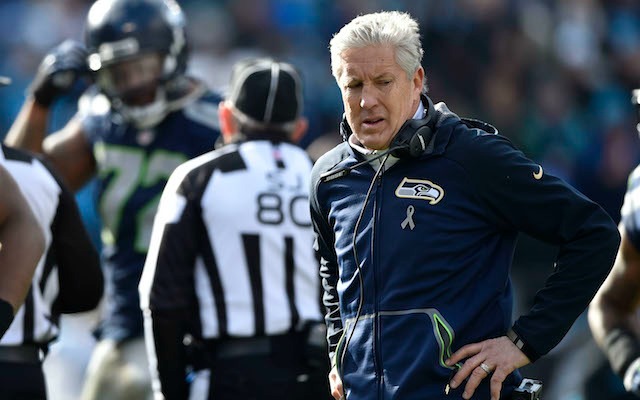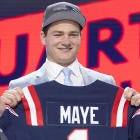When the NFL released its playoff schedule this year, a lot of people felt that the Seahawks got the short end of the stick.
During the wild-card and divisional round of the playoffs, there are four time slots: The Saturday afternoon slot (4:30 p.m. ET), the Saturday night slot (8:15 p.m. ET), the Sunday afternoon slot (1 p.m. ET) and the Sunday afternoon slot (4:40 p.m. ET).
Even though the Seahawks were the only team that plays home games in the Pacific time zone to make the postseason, they got stuck with the two worst time slots that a West Coast team can get: the 1 p.m. ET kickoff on both weekends, which feels like 10 a.m. PT to Seahawks players.
#Seahawks fans should be upset. NFL scheduled them to play back to back 10 am PT playoff games with long road trips. Patently unfair
— Ben Volin (@BenVolin) January 4, 2016
Another reason for Vikings to believe: why is the league making Seattle play in the only 10am Pacific playoff spot? What an awful decision.
— Aaron Schatz (@FO_ASchatz) January 4, 2016
Now, there are a lot of people out there who don't think the time difference is a big deal and that playing a game when your body thinks it's 10 a.m. is no different than playing a game when your body thinks it's 1 p.m. ET.
Seahawks' fans are such sore losers. "It was an early game 10 am PST." "The field was crappy & wet", etc. Just accept you got beat & move on
— Nedac (@LeeOnTheBeat) January 19, 2016
However, statistics seem to show that a putting a West Coast team in a 1 p.m. ET game puts them at an inherent disadvantage.
It's not the actual 10 a.m. start that's killing West Coast teams though; it's going to bed and waking up. If you're a West Coast team that's supposed to go to bed at midnight ET, that's a problem because many of the players aren't tired because it feels like 9 p.m. to them.
On top of that, you have an incredibly early wakeup call, as Cardinals coach Bruce Arians noted this week.
The NFC title game will kick off at 6:40 p.m. ET on Sunday, which was thrilling news to Arians, who actually felt bad that the Seahawks had to play two 1 p.m. ET games in a row.
"Knowing what it is like to have a 4:30 (a.m.) wakeup call for a game is tough," Arians said. "Thank God it is a 6 o'clock game."
Basically, Arians is saying it's a struggle for the players with home games in the Pacific and Mountain time zones because when they wake up at 6:30 a.m. ET or 7:30 a.m. ET for a Sunday 1 p.m. ET game, their bodies thinks it's 4:30 a.m., and that's rough.
The sluggish start to the day generally leads to a sluggish start in the game and stats seem to back that up.
Since 2002, Pacific and Mountain time zone teams have been outscored 202-56 in the first half of all 1 p.m. ET playoff games. Things generally change in the second half though, with the Western team outscoring its opponents 189-87.
Since 2002, there have been a total of 28 games played in the 1 p.m. ET time slot during the playoffs, which means a total of 56 teams have been involved. Of those 56, 11 were Pacific or Mountain time zone teams (19.7 percent).
Now, here's where the sluggish start comes in: Of those 56 teams, five of them have been shut out in the first half, and almost all of them were West Coast teams (four out of five).
Think about that. West Coast teams only consist of 19.7 percent of the 1 p.m. playoff field, but they made up 80 percent of the teams that got shut out in the first half. And here's the crazy part: All four West Coast teams that were shut out were Pete Carroll teams.
Since 2010 when Carroll took over, the Seahawks have been outscored 75-0 during the first half of 1 p.m. ET playoff games, so the first half meltdown in Carolina wasn't a complete surprise if you've watched the Seahawks in the postseason before. Seattle actually trailed Atlanta 20-0 at halftime in January 2013. In January 2011, they were shutout 21-0 in the first half by the Bears.
The only non-West Coast team to be shutout in the first half of a 1 p.m. ET game between 2002 and this year was the 2005 Giants.
The Seahawks aren't the only Pacific/Mountain time zone team that deals with this problem though. Of the 56 teams that have played in the 1 p.m. slot, there have only been 22 times where a team scored seven or fewer points in the first half.
Of those 22 times, nine were a Pacific or Mountain time zone team.
Again, those teams only represent 19.7 percent of the 1 p.m. playoff field since 2002, but they make up 40.9 percent of teams that scored seven or fewer points in the first half.
In total, nine out of the 11 West Coast teams (81.8 percent) that have been forced to play at 1 p.m. ET in the postseason have scored seven or fewer points in the first half. For Eastern and Central time zone teams, only 13 out of 45 teams (28.9 percent) have gotten off to a slow start of seven or fewer points in the first half.
Even more telling is that in the 11 games that involved a Pacific or Mountain time zone team, every single one of them trailed at halftime, except for one: the 2013 49ers, who led Carolina 13-10.
That 49ers team is also an outlier in another respect: They scored eight or more points in the first half. Since 2002, there have been 34 teams that have scored eight or more points in the first half of a 1 p.m. ET and guess what: 32 of them were Eastern or Central time zone teams.
That means just two out of 34 of those came from the Pacific/Mountain time zone.
Also, there have been a total of nine games where a team trailed by 14 or more points at halftime of a 1 p.m. ET game and, you guessed it, most of those were Pacific/Mountain time zone teams (five out of nine).
Things almost always get better in the second half though, as 10 out of the 11 West Coast teams outscored their opponents after halftime.
Pacific and Mountain time zone teams are just flat out ugly during the first half of 1 p.m. ET games.
The easiest solution here is for Western teams to play better. If they don't get the fifth or sixth seed, then they presumably won't be as likely to play at 1 p.m. However, it's not that simple. The division-winning 49ers (2002), Chargers (2007) and Seahawks (2010) all had to play a 1 p.m. ET game during the playoffs.
If the NFL wants to keep a competitive balance in the playoffs, then it needs to keep Pacific and Mountain time zone teams out of the 1 p.m. ET playoff slot.






















